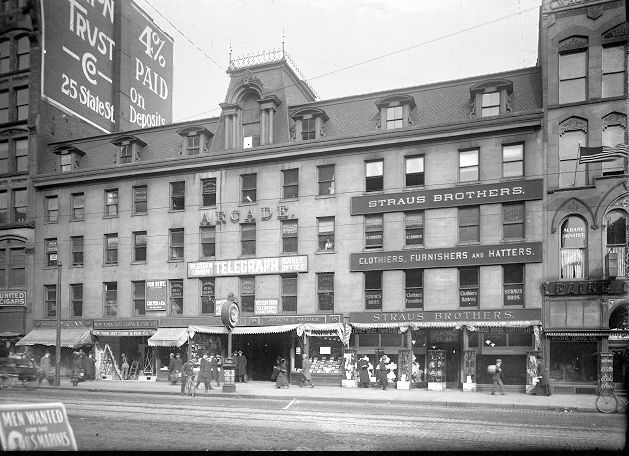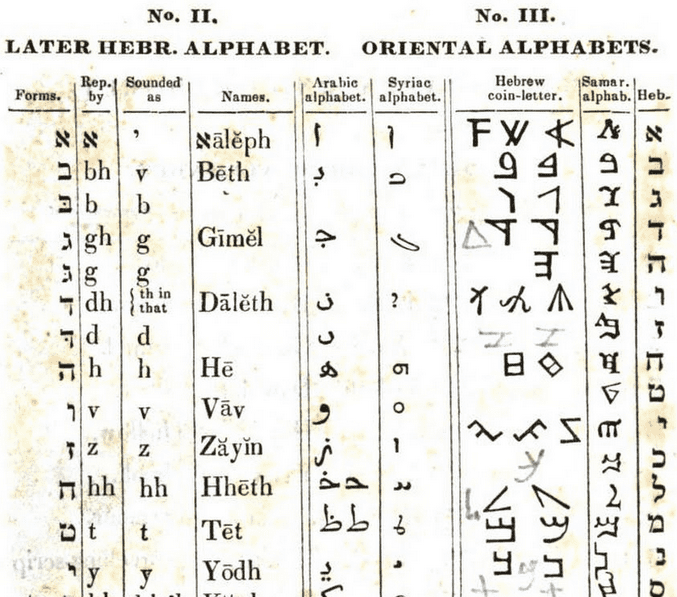
During our recent Sunday school lesson on Enos and the Words of Mormon, I had the chance to point out a couple of apparent problems in the text that are commonly used to undermine faith in the Book of Mormon, or that at least raise puzzling questions for some readers. The lesson began with Jacob 7:27, the closing verse of Jacob’s short book that mentions the transfer of the plates of Nephi to his son, Enos. The book of Enos then follows, beginning with a reference to his noble father: “Behold, it came to pass that I, Enos, knowing my father that he was a just man — for he taught me in his language, and also in the nurture and admonition of the Lord — and blessed be the name of my God for it –” (Enos 1:1). The problem comes near the end when Enos gives us specific information about the time of his writing: “And it came to pass that I began to be old, and an hundred and seventy and nine years had passed away from the time that our father Lehi left Jerusalem.” Jacob was born during the eight-year journey from Jerusalem to Bountiful — here I must mention that the eight years likely included several years in Bountiful, itself part of an uninhabited, uncultivated “wilderness” per excellent scholarship from Godfrey Ellis published in Interpreter and as Jeffrey Chadwick has proposed, arguing that as many as six of those eight years were spent at Bountiful). So the time from Jacob’s birth to Enos’s old age had to be greater than 170 years. While it’s possible for a relatively old man to father a son who then lives for a very long time, it still seems problematic. It’s certainly not what a writer of fiction would say without explanation — in a fictional work, it would be viewed as an obvious blunder that should have been caught by the author or an editor.
As with many issues in the scriptures, the problem may be one of the unexamined assumptions that we make about the text. Jacob mentions his son Enos, and Enos mentions his father. So we naturally assume that his father was Jacob, But the book of Enos does not mention Jacob at all. How do we know that this Enos is the same Enos Jacob mentioned? This excellent question is raised on the outstanding website by Clay Gorton, Ask Gramps, in his article, “I’m confused about the age of Enos and some missing time. Can you help?” from Feb. 13, 2018. Gorton suggests that Enos could have been the son or even grandson of the Enos mentioned in Jacob 7:27. Thus, there could have been “an Enos the elder and an Enos the younger, similar to Alma the elder and Alma the younger. Jacob gave the plates to Enos the elder, who was Enos’ father referred to in Enos 1:1, and then Enos the elder gave the plates to Enos the younger, who wrote the Book of Enos. Who knows – maybe there were several generations in there!” The author of the book of Enos as the grandson or even great-grandson of Jacob creates a satisfying proposal for the puzzling chronology and is not inconsistent with the text.
In fact, as I offered my comment on the chronology issue in our Sunday School class, Enos having a father other than Jacob might better fit a clue Enos gives us. When he went to hunt, he meditated upon “the words which I had often heard my father speak concerning eternal life, and the joy of the saints” (Enos 1:3). Enos had a father who frequently talked about joy. Jacob, as many careful readers have noted, seems gloomy and anxious, weighed down with sorrow and grief. Before Jacob gives us “adieu” to his readers, he summarizes his life: “our lives passed away like as it were unto us a dream, we being a lonesome and a solemn people, wanderers, cast out from Jerusalem, born in tribulation, in a wilderness, and hated of our brethren, which caused wars and contentions; wherefore, we did mourn out our days” (Jacob 7:27). Jacob does mention eternal joy for the saints in a sermon Nephi cites (2 Nephi 9:18), but joy does not seem to be a frequent motif on his writings. A father more focused on joy with a less mournful outlook could have been another Enos, the father of the Enos who wrote the book of Enos.
As another aside, Jacob had been raised under very trying conditions with abusive brothers. Just the trauma of what young Jacob experienced on the sea could have caused lasting damage (1 Nephi 18:10-18). A storm raged for days after his wicked brethren tied Nephi up and threatened whoever spoke out for him, causing such sorrow for Lehi and Sariah that they were near death, with Jacob and Joseph suffering in fear and for lack of nourishment. Such fearful encounters with the hateful wickedness of his brethren may have occurred multiple times. Jacob’s anxiety and sorrow is reflected in his words several times. There may have been some lasting mental health issues from all that, as Jared M. Halverson respectfully points out in his essay, “‘Because of Faith and Great Anxiety’: Jacob and the Challenges of Mental Health” in Jacob: Faith and Great Anxiety, ed. Avram R. Shannon and George A. Pierce (Provo, UT: Religious Studies Center, Brigham Young University; Salt Lake City: Deseret Book), 273-308. Perhaps Jacob’s love and teachings in the New World gave his descendants a less anxious outlook on life, though they still had trouble enough. I really like the concept that the father of Enos was not the son named Enos that Jacob mentions, but a son or grandson of that Enos.
One further thought on Enos is that recent scholarship has provided solid evidence that this short book employs the rhetorical/poetic tool of chiasmus and does so in a way that makes the book literally centered on Christ. That’s an important subtlety that can help us understand the ultimate message of the Book of Mormon: Jesus Christ as our Redeemer. See Stephen Kent Ehat’s detailed article, “Centered on Christ: The Book of Enos Possibly Structured Chiastically,” also published in Interpreter in 2023.
Jacob 7:27, the verse that began our lesson, raises another famous “weakness” of the Book of Mormon when it ends with the farewell, “Brethren, adieu.” A surprisingly persistent argument against the authenticity of the Book of Mormon is that “adieu” is French word and that French did not even exist in Jacob’s day, so Joseph obviously made a horrible blunder in his fraudulent work. You should all know basic answers to this objection, such as English didn’t exist, either, but this is of course a translation of Jacob’s words. Further, “adieu” is typically found in English dictionaries and is part of Webster’s 1828 dictionary. But there’s even more to this. Again, my friend and now Associate Editor of Interpreter: A Journal of Latter-day Saint Faith and Scholarship, has offered some great analysis on this issue. See his 2023 essay, “Toward a Greater Appreciation of the Word Adieu in Jacob 7:27,” published in Interpreter.
It’s not just that “adieu” can be used without objection in an English translation, it turns out that for the context of Jacob 7:27, it is the perfect word to use. Ellis notes that in French, adieu is not simply equivalent to our casual “good-bye” or to “adios” in Spanish. It is a more serious word commonly used when there may be a long-term separation, or even risk of permanent separation. In light of the deeper meaning of adieu, Ellis concludes that “rather than reflecting an error on the part of Joseph Smith, the word adieu, with its deeper nuance of finality until God, is not only an appropriate term, it appears to strengthen rather than undermine the case for the authenticity of the Book of Mormon.” This looks like another case of an apparent weakness becoming a strength. Such details aren’t just about apologetics and defending us from outside attacks, but about better understanding what the text is telling us. In many cases, scholarship into the scriptures helps us understand the message and the doctrine more clearly. We are missing many spiritual feasts or at least tasty tidbits if we assume that we already know everything we need to fully understand and benefit from the many messages preserved in our sacred texts.
In our Sunday School lesson, the Words of Mormon was mentioned just in passing due to lack of time, but here we have one of the most valuable recent discoveries that Latter-day Saints really ought to know to appreciate what this enigmatic book is and what it means for the Book of Mormon. Essential reading on the Words of Mormon was published in 2021 in Interpreter by Clifford P. Jones in the article, “That Which You Have Translated, Which You Have Retained.” For many decades we have all assumed that the Words of Mormon was the last part of Mormon’s abridgment work, written as a separate short insert to bridge the addition of the small plates, the last text translated by Joseph Smith, with his already finished abridgment of the large plates. In fact, Jones makes a compelling case that resolves many puzzles and draws upon evidence in the Printer’s Manuscript and other factors to show us that what we call the Words of Mormon was actually part of Mormon’s abridgment of the Book of Mosiah, an editorial aside that he made while abridging what was marked as Mosiah chapter 2 in the Original Manuscript, from which the first 116 pages were lost by Martin Harris. This important discovery is a tremendous story of careful investigation that students of the Book of Mormon really should be discussing more frequently. It’s a complete reversal of the old paradigm. Rather than the last words Mormon wrote, these are the first words of his that survived and made it into our Book of Mormon.
Understanding the Words of Mormon is really just a part of the opening chapters of Mosiah helps us see that Mormon was aware of the small plates as he began the surviving abridgment we have in Mosiah, Alma, etc. We can see his intention to apply the knowledge from the small plates to show the fulfillment of ancient prophecy. We can better appreciate the many allusions made to that record. And we can see the hand of the Lord even more clearly in preparing the way for the shaping of the Book of Mormon and the preparation for the recovery from the foreknown loss of the first part of Joseph’s translation. It also helps us understand puzzles such as why the Book of Mosiah doesn’t begin in the way other books do. It’s different because the opening pages of that book are missing.
There’s always much more to learn about our scriptures. Don’t slack off in your learning or you’ll miss too many treasures of faith and knowledge.











Funny, the only ones I’ve heard claim ‘adieu’ was evidence of anything is the apologist, I have never once heard it used as an argument against anything, let alone persistently.
“to undermine faith in the Book”
Uh, faith in a book, be it the Bible or Jacob? Is it not suppose to be faith in the prophesied Messiah?
“knowing my father that he was a just man”
There are no good but God.
Yep just as I thought. Even Jeff as fully capitulated and now blocks comments because he can no longer hold a light to rational thinkers. He has proven he is Mormon only because he was born so, not to rational thought process or conclusion.
Ironic.